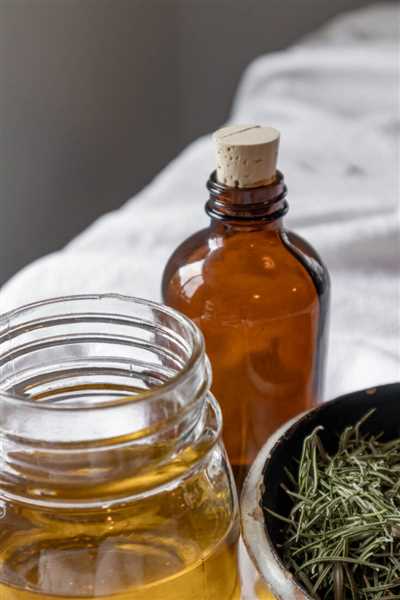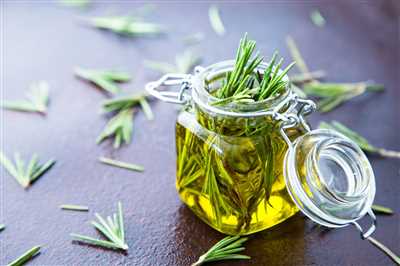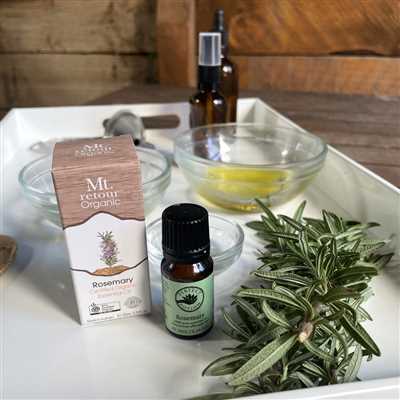
If you have a small herb garden or even just a few pots on your balcony, you probably have some fresh rosemary at your disposal. Rosemary is not only a popular herb for cooking, but it also has many wellness benefits. One of the most effective ways to make use of this herb is by making your own rosemary oil. Whether you want to use it for cooking, hair growth, or even for its soothing scent, making rosemary oil at home is easy and fun.
There are different methods for making rosemary oil, but one of the most popular and easiest ones is the infused oil method. This method doesn’t require any cooking and takes only a small amount of time.
To make rosemary oil using the infused oil method, start by gathering a handful of fresh rosemary sprigs from your garden. Make sure to wash them thoroughly to remove any dirt or pests. Then, air dry the rosemary for about 10 to 15 minutes to remove any excess moisture.
Next, heat a small amount of a carrier oil, such as castor oil or olive oil, in a pan over low heat. Once the oil is warm, add the dried rosemary sprigs and let them steep for about 30 minutes. This will allow the oil to absorb all the beneficial properties of the herb.
After 30 minutes, strain the oil using a fine-mesh sieve or cheesecloth to remove the rosemary sprigs. The resulting oil will have a strong rosemary scent and will be ready to use.
You can use your homemade rosemary oil for a variety of purposes. For cooking, it adds a delicious flavor to roasted vegetables, grilled meats, or homemade salad dressings. For hair care, massage the oil into your scalp to stimulate blood flow and promote hair growth. The oil can also be used as a natural moisturizer for your skin or added to your bath for a relaxing and soothing experience.
So, if you have some fresh rosemary on hand and a few minutes to spare, why not try making your own rosemary oil? It’s a simple and rewarding process that allows you to enjoy all the benefits this amazing herb has to offer.
- How to Make Rosemary Oil for Hair Growth
- Ingredients:
- Instructions:
- Fresh Herb Infused Rosemary Oil
- How to Make Rosemary Oil
- The Cooking Method
- The No-Cook Method
- Homemade rosemary oil
- Rosemary Castor Oil Hair Growth Recipe
- Ingredients:
- Instructions:
- Videos:
- 4 Ways to Extract Rosemary at Home Infusion Tincture Tea Distillation, Benefits of Rosemary
How to Make Rosemary Oil for Hair Growth
If you’re looking for a natural and effective method to stimulate hair growth, then making your own rosemary oil is a great option. Rosemary, a popular herb used in cooking, has been known to promote hair growth and improve scalp health. By infusing rosemary into oil, you can create a homemade hair treatment that can help nourish your hair follicles and encourage hair growth.
To make rosemary oil, you’ll need a small amount of fresh rosemary, carrier oil (such as olive oil or coconut oil), and some time. Here’s a simple no-cook method that guides you through the process:
Ingredients:
- 1 cup of fresh rosemary
- 1 cup of carrier oil (olive oil or coconut oil)
Instructions:
- Wash the fresh rosemary to remove any dirt or impurities. Pat it dry with a clean towel.
- Take a small, heat-proof glass jar or bottle and place the rosemary inside.
- Pour the carrier oil over the rosemary, making sure it covers the herb completely.
- Seal the jar tightly and give it a gentle shake to mix the oil and rosemary.
- Place the jar in a warm and sunny location, such as a windowsill, and let it sit for 2-3 weeks. This allows the oil to become infused with the scent and properties of the rosemary.
- After the infusion period, strain the oil to remove any solid particles. You can use a fine mesh strainer or cheesecloth for this step.
- Your homemade rosemary oil for hair growth is now ready to use!
To use the rosemary oil, simply apply a small amount to your scalp and hair, and gently massage it in. Leave it on for at least 30 minutes or overnight for the best results. You can even mix the rosemary oil with other hair-healthy oils like castor oil for added benefits.
The rosemary oil works by stimulating blood circulation in the scalp, which can promote hair growth. It also helps to nourish the hair follicles, strengthen the hair strands, and improve scalp health. With regular use, you may notice thicker and healthier hair over time.
So, if you have a garden with fresh rosemary or love to cook with this herb, why not try making your own rosemary oil for hair growth? Not only is it a cost-effective and natural solution, but it also allows you to customize the scent and amount of oil you make. Give it a try and enjoy the benefits of this homemade hair treatment!
Fresh Herb Infused Rosemary Oil
If you have a rosemary herb in your garden and want to make the most of its fresh and herbaceous scent, consider making your own infused rosemary oil. Not only is it an effective way to use up your abundant rosemary supply, but it also has numerous health and wellness benefits.
Rosemary oil is known for its ability to improve blood circulation, promote hair growth, and add flavor to your cooking. It is a favorite among chefs for its robust and aromatic scent. Making infused rosemary oil is a simple and no-cook method that requires only a small amount of time and ingredients.
To make fresh herb infused rosemary oil, follow these simple steps:
- Start by washing your fresh rosemary thoroughly to remove any dirt or debris.
- If you have a large amount of rosemary, trim it down to fit into your jar or container.
- Place the fresh rosemary in a clean and dry glass jar or container.
- Choose a carrier oil for your infusion. Olive oil is a popular choice, but you can also use other oils like sunflower or coconut oil.
- Pour the carrier oil into the jar, completely covering the rosemary.
- Seal the jar tightly and allow the mixture to infuse for at least two weeks. You can place it in a sunny spot to enhance the infusion process.
- After the infusion period, strain the oil to remove the rosemary leaves. You can use a fine-mesh strainer or cheesecloth for this step.
- Transfer the infused rosemary oil to a clean bottle or container for storage.
- Your homemade rosemary oil is now ready to use! It can be used in various recipes, such as salad dressings, marinades, or drizzled over roasted vegetables.
Not only can you use this homemade infused rosemary oil in your cooking, but it also works wonders for your hair and scalp. Massage a few drops of the oil into your scalp to stimulate hair growth and improve overall hair health. For a more intensive treatment, mix it with a tablespoon of castor oil and apply it to your hair. Leave it on for 30 minutes to an hour before shampooing.
With this easy-to-follow recipe, you can enjoy the benefits of fresh herb infused rosemary oil in no time. Whether you’re a culinary enthusiast or seeking natural remedies for hair and wellness, making your own rosemary oil is a cost-effective and rewarding endeavor. So why not try it out and see the difference it can make?
How to Make Rosemary Oil

Rosemary is a versatile herb that is often used in cooking to add flavor to a variety of recipes. If you have a herb garden or access to fresh rosemary, making your own rosemary oil is a great way to preserve its scent and benefits for your scalp, hair, and even for holistic wellness.
There are several methods for making rosemary oil, but the most effective one involves using heat to infuse the oil with the herb’s oils and scent. Here is a no-cook method for making homemade rosemary oil:
- First, gather a small bunch of fresh rosemary from your garden or buy it from a reputable source.
- Next, remove the leaves from the stem and give them a quick rinse. Pat them dry to remove any excess moisture.
- Then, place the rosemary leaves in a clean jar and add enough oil (such as olive or castor oil) to cover the leaves completely.
- Cover the jar with a lid and let it sit in a cool, dark place for at least 2 weeks. This allows the oil to become infused with the rosemary’s aroma and beneficial properties.
- After 2 weeks, strain the oil using a fine-mesh sieve or cheesecloth to remove any plant material.
- Your homemade rosemary oil is now ready to use in your favorite recipes or as a hair and scalp treatment. You can store it in a clean, airtight container in a cool, dark place for up to 6 months.
Rosemary oil is known to promote hair growth, improve blood circulation to the scalp, and even offer some antibacterial properties. Whether you’re a chef looking to enhance your culinary creations or someone interested in natural wellness, making your own rosemary oil is a simple and rewarding process.
So why not give it a try? With just a few ingredients and a little bit of time, you can create your own homemade rosemary oil that smells amazing and offers numerous benefits for your hair, scalp, and overall well-being.
The Cooking Method
Making rosemary oil at home is a simple and effective way to infuse the scent and flavor of this aromatic herb into your recipes. Whether you’re a chef looking to add a unique touch to your dishes or simply a home cook wanting to elevate your cooking, homemade rosemary oil is a valuable condiment to have in your kitchen.
One of the most common methods for making rosemary oil is the no-cook method. This involves using fresh rosemary from your garden or a trusted source, infusing it into a carrier oil over time. The no-cook method is preferred because it requires no heat, which can potentially damage the volatile essential oils present in the rosemary.
Here’s a simple recipe to make your own homemade rosemary oil:
- First, gather a small amount of fresh rosemary sprigs from your garden. Wash them thoroughly to remove any dirt or debris.
- Then, heat a carrier oil such as olive oil or castor oil on low heat for a few minutes. This helps to enhance the infusion process.
- Next, add the rosemary sprigs to the warm oil and gently stir to ensure the herb is fully submerged.
- Allow the rosemary to infuse in the oil for at least a few hours or overnight. The longer you let it infuse, the stronger the rosemary scent and flavor will be.
- After the desired steeping time, strain the oil to remove the rosemary leaves. You can use a fine-mesh strainer or cheesecloth for this step.
- Transfer the infused oil to a clean, airtight container and store it in a cool, dark place. It can last for several weeks if stored properly.
Your homemade rosemary oil is now ready to be used in a variety of ways. Add it to your favorite recipes to enhance the flavor of your dishes, or use it as a hair and scalp treatment for its potential benefits in promoting hair growth and blood circulation.
With this simple cooking method, you can enjoy the benefits of rosemary oil in your own kitchen without having to rely on store-bought options. Happy cooking and wellness!
The No-Cook Method

If you’re short on time or don’t have access to a stove, you can still make your own homemade rosemary oil with the no-cook method. This method is quick, easy, and requires nothing more than fresh rosemary and a carrier oil of your choice.
To start, gather your ingredients. You’ll need a small amount of fresh rosemary from your garden or other sources, as well as a carrier oil like olive oil or castor oil. Rosemary is known for its wellness benefits, including promoting hair growth and stimulating blood circulation in the scalp.
First, wash the rosemary sprigs and pat them dry with a towel. Then, remove the leaves from the stems and chop them finely. The amount of rosemary you use will depend on how strong you want the scent and the effectiveness of the oil to be.
Next, place the chopped rosemary into a clean glass jar. Pour enough carrier oil to fully cover the herbs, ensuring that they are completely submerged. You can experiment with different oils, but olive oil is often the go-to choice for its nourishing properties.
Seal the jar tightly and give it a good shake to mix the ingredients well. Let the mixture sit for at least 24 hours in a cool, dark place to allow the rosemary to infuse into the oil. The longer you let it sit, the stronger the scent and properties will be.
After the infusion time has passed, strain the oil by pouring it through a fine-mesh sieve or cheesecloth into a clean container. This will remove the rosemary debris and yield a smooth, homemade rosemary oil.
Your homemade rosemary oil is now ready to use! Apply a few drops to your hair or scalp and massage it in for a revitalizing experience. You can also use it as a base for DIY skincare recipes or in cooking to enhance the flavor of your dishes.
By using the no-cook method, you can make rosemary oil at home without any heat or cooking involved. It’s a simple and effective way to enjoy the benefits of this fragrant herb and incorporate it into your wellness routine.
Homemade rosemary oil
If you have a small rosemary bush in your garden, there’s nothing more satisfying than making your own homemade rosemary oil. Not only is it a cost-effective method, but it also allows you to have the freshest and most potent rosemary oil possible.
The process of making rosemary oil is simple and requires minimal time and effort. With just a few guides, you can create a batch of infused oil that can be used for various purposes, from cooking to hair and scalp wellness.
Here’s a no-cook method for making rosemary oil:
| Ingredients | Amount |
|---|---|
| Fresh rosemary | A small handful or as desired |
| Carrier oil (such as olive oil or castor oil) | Enough to cover the rosemary |
Instructions:
- Pluck the rosemary leaves from the stem and wash them well to remove any dirt or debris.
- Pat dry the rosemary leaves using a clean towel or air-dry them for a few minutes.
- Place the rosemary leaves in a clean glass jar.
- Pour enough carrier oil over the rosemary leaves to completely submerge them.
- Seal the jar tightly and shake it gently to ensure the rosemary leaves are well-coated.
- Store the jar in a warm place, away from direct heat and sunlight, to allow the oil to infuse.
- Let the rosemary oil infuse for at least two weeks, shaking the jar gently every few days.
- After two weeks, strain the infused oil using a fine-mesh sieve or cheesecloth to remove any plant matter.
- Transfer the strained rosemary oil to a clean bottle for storage.
This homemade rosemary oil can be used in cooking, as a hair and scalp treatment, or added to bath products for a relaxing scent. Its wellness benefits include improving blood circulation, promoting hair growth, and providing an effective herb for various recipes in the kitchen.
So, if you’re a chef or someone who loves cooking with fresh herbs, making your own rosemary oil is a rewarding and cost-effective way to have a versatile ingredient available at all times.
Rosemary Castor Oil Hair Growth Recipe
One of the most effective ways to promote hair growth and improve the overall wellness of your hair is by using a homemade rosemary castor oil recipe. This recipe combines the nourishing properties of castor oil with the stimulating benefits of rosemary herb, resulting in a powerful hair growth tonic.
For this recipe, you will need a small amount of fresh rosemary from your garden or you can purchase dried rosemary from the store. The method for making rosemary castor oil is a no-cook, heat-free process that ensures the potency and effectiveness of the final product.
Ingredients:
| 1 cup castor oil |
| 1/4 cup fresh or dried rosemary |
Instructions:
1. In a glass jar, combine the castor oil and rosemary herb.
2. Stir well to ensure that the rosemary is evenly distributed throughout the oil.
3. Seal the jar tightly and place it in a cool, dark place for at least two weeks. This will allow the oil to become infused with the beneficial properties of the rosemary.
4. After two weeks, strain the oil to remove any herb particles. You can use a fine sieve or cheesecloth for this process.
5. Transfer the strained oil into a clean, airtight container for storage.
To use the rosemary castor oil for hair growth, simply apply a small amount to your scalp and massage it in for a few minutes. Leave the oil on your hair for at least 30 minutes, or overnight for maximum benefit. The oil will work to stimulate blood circulation to the scalp, nourish the hair follicles, and promote healthy hair growth.
With this simple and natural recipe, you can enjoy the benefits of rosemary and castor oil for hair growth without any harsh chemicals or additives. Incorporate this oil into your hair care routine and notice the difference it can make in the health and thickness of your hair.








